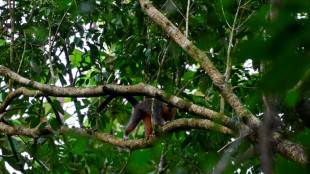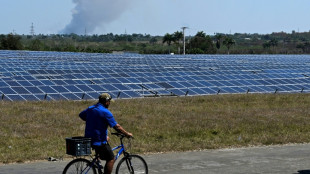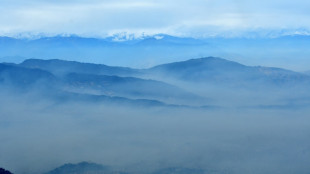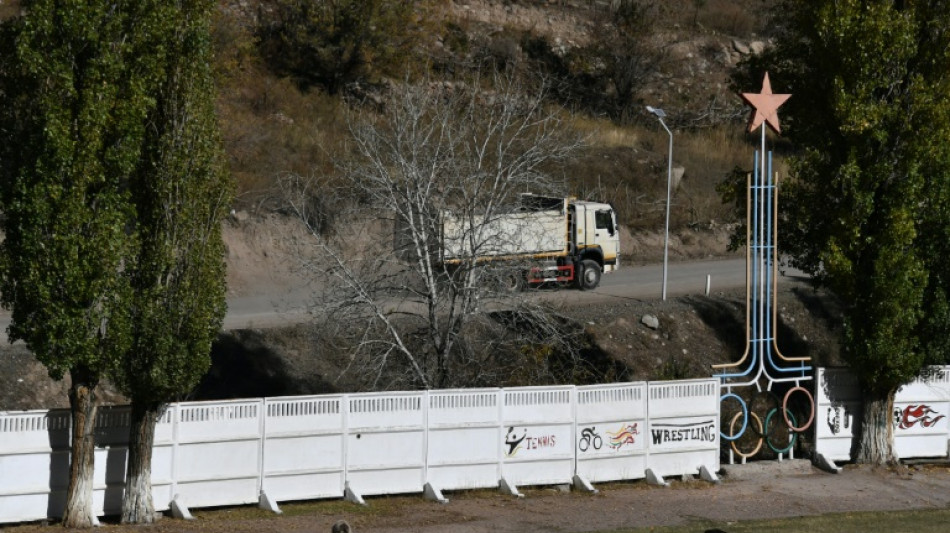
-
 England, Germany and Spain on mark in women's Nations League
England, Germany and Spain on mark in women's Nations League
-
Bayern's Musiala to miss Inter first leg with injury

-
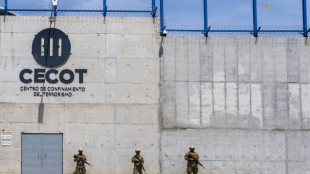 Judge orders return to US of Salvadoran man deported in error
Judge orders return to US of Salvadoran man deported in error
-
'Class' Freeman eases Northampton past Clermont and into Champions Cup quarters

-
 Amadou of Malian blind music duo dies aged 70
Amadou of Malian blind music duo dies aged 70
-
Freeman hat-trick eases Northampton into Champions Cup quarters with Clermont win

-
 Defiant Trump dismisses stock market's tariff plunge
Defiant Trump dismisses stock market's tariff plunge
-
Musiala injury sours Bayern win at Augsburg

-
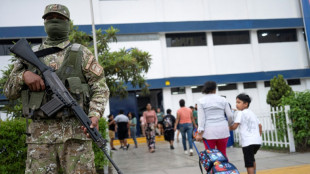 Peruvian schoolkids living in fear of extortion gangs
Peruvian schoolkids living in fear of extortion gangs
-
Top seed Pegula rallies to oust defending champ Collins in Charleston

-
 Amadou of Malian blind music duo Amadou & Mariam dies aged 70
Amadou of Malian blind music duo Amadou & Mariam dies aged 70
-
California to defy Trump's tariffs to allay global trade fears

-
 Bayern's Musiala subbed off with injury days out from Inter clash
Bayern's Musiala subbed off with injury days out from Inter clash
-
Russian strike kills 16 in Ukraine leader's home city, children among dead
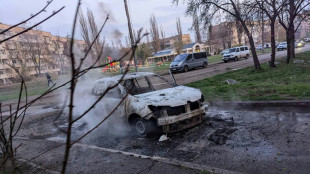
-
 NBA fines Grizzlies' Morant for imaginary gun gesture
NBA fines Grizzlies' Morant for imaginary gun gesture
-
Trump tariffs offer opportunity for China
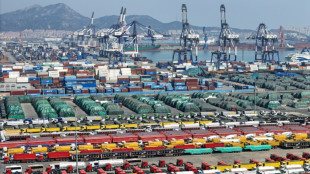
-
 UK comedian Russell Brand charged with rape
UK comedian Russell Brand charged with rape
-
Marsh, Markram help Lucknow edge Mumbai in IPL

-
 Trump gives TikTok extra 75 days to find buyer
Trump gives TikTok extra 75 days to find buyer
-
Israel attorney general accuses PM of 'conflict of interest' in security chief dismissal

-
 Emery glad to see Rashford make landmark appearance
Emery glad to see Rashford make landmark appearance
-
Sean 'Diddy' Combs faces more charges ahead of criminal trial

-
 Russian missile strike kills 14 in Ukraine leader's home city
Russian missile strike kills 14 in Ukraine leader's home city
-
Trump's tariff Big Bang puts global economy under threat

-
 I Am Maximus backed for National as Mullins hot streak continues
I Am Maximus backed for National as Mullins hot streak continues
-
2014 World Cup winner Hummels to retire at season's end

-
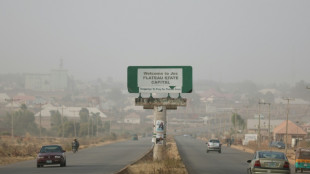 Intercommunal violence kills dozens in central Nigeria
Intercommunal violence kills dozens in central Nigeria
-
Nigerian, S. African music saw 'extraordinary growth' in 2024: Spotify

-
 Russell Brand: From Hollywood star to rape suspect
Russell Brand: From Hollywood star to rape suspect
-
France soccer star Mbappe unveiled in London... in waxwork form

-
 Trump goads China as global trade war escalates
Trump goads China as global trade war escalates
-
Israel expands Gaza ground offensive, hits Hamas in Lebanon
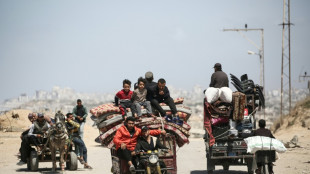
-
 TikTok faces new US deadline to ditch Chinese owner
TikTok faces new US deadline to ditch Chinese owner
-
US Fed Chair warns tariffs will likely raise inflation, cool growth

-
 Mbappe among three Real Madrid players fined for 'indecent conduct'
Mbappe among three Real Madrid players fined for 'indecent conduct'
-
How can the EU respond to Trump tariffs?

-
 Canada loses jobs for first time in 3 years as US tariffs bite
Canada loses jobs for first time in 3 years as US tariffs bite
-
Real Madrid and Barcelona respect each other, says Ancelotti

-
 Nations divided ahead of decisive week for shipping emissions
Nations divided ahead of decisive week for shipping emissions
-
Trump goads China after Beijing retaliates in global trade war

-
 Arteta urges Arsenal to enjoy "beautiful" run-in despite injury woes
Arteta urges Arsenal to enjoy "beautiful" run-in despite injury woes
-
London mayor gets new powers to revive capital's ailing nightlife

-
 Italy's ski star Brignone takes on 'new challenge' after serious leg injury
Italy's ski star Brignone takes on 'new challenge' after serious leg injury
-
Amorim in a 'rush' to succeed at Man Utd

-
 PSG coach Luis Enrique targets unbeaten season
PSG coach Luis Enrique targets unbeaten season
-
Duterte victims seeking 'truth and justice': lawyer

-
 US job growth strong in March but Trump tariff impact still to come
US job growth strong in March but Trump tariff impact still to come
-
UK comedian and actor Russell Brand charged with rape

-
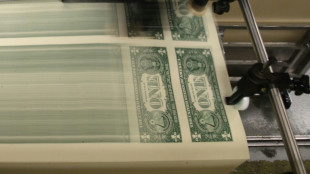 Stocks, oil slump as China retaliates and Trump digs in heels
Stocks, oil slump as China retaliates and Trump digs in heels
-
Postecoglou 'falling out of love' with football due to VAR

| RBGPF | 1.48% | 69.02 | $ | |
| RYCEF | -18.79% | 8.25 | $ | |
| CMSC | 0.13% | 22.29 | $ | |
| SCS | -0.56% | 10.68 | $ | |
| BCC | 0.85% | 95.44 | $ | |
| NGG | -5.25% | 65.93 | $ | |
| GSK | -6.79% | 36.53 | $ | |
| AZN | -7.98% | 68.46 | $ | |
| RIO | -6.88% | 54.67 | $ | |
| BTI | -5.17% | 39.86 | $ | |
| RELX | -6.81% | 48.16 | $ | |
| JRI | -7.19% | 11.96 | $ | |
| VOD | -10.24% | 8.5 | $ | |
| BCE | 0.22% | 22.71 | $ | |
| CMSD | 0.7% | 22.83 | $ | |
| BP | -10.43% | 28.38 | $ |

Toxic towns in Kyrgyzstan battling radioactive danger
In a mask and a hazmat suit, Ermek Murataliyev drives a truck filled with Soviet-era radioactive waste along the winding mountain roads of Kyrgyzstan.
His is a hazardous mission: two such trucks crashed into ravines over the summer.
Drivers in this former Soviet Central Asian state are forbidden to stop until they reach their final destination -- a storage zone where the waste will be buried under thick layers of compacted clay and rock.
Murataliyev had to undergo a medical inspection and have regular health checks to get the job.
"I have been trained on how to keep myself safe," he said.
Three decades on from independence, Kyrgyzstan is still dealing with the consequences of the Cold War nuclear arms race, when Central Asia provided the Soviet Union with all of its uranium.
Kyrgyz authorities say there are now six million cubic metres of radioactive waste in 30 sites such as Min-Kush, which require complex and costly disposal measures.
"When the Soviet Union collapsed, Kyrgyzstan had neither the equipment nor the money to transfer the waste to safe sites," said Ilgiz Ernis, deputy mayor of the Min-Kush municipality.
"The process was badly delayed," he said.
The disposal work is now in its final stages and is being carried out by the Russian nuclear giant Rosatom as well as the European Union and the European Bank for Reconstruction and Development.
- 'Radioactive lake' -
Local resident Aiman Kishkenalina said "this problem is not just for Min-Kush but for all of Kyrgyzstan".
Kishkenalina is one of around 5,600 residents of the run-down uranium mining town -- a ticking time bomb with grave human and environmental consequences.
"Some experts with dosimeters found that the (radiation) level was too high in some places," she said.
Local officials say it is in fact up to six times higher than the norm.
Radioactive waste has also been found in the river running through Min-Kush that flows into the Syr Darya, the second-largest river in the region, potentially threatening up to 80 million people.
"The (radioactive) content of the water that passes under the disposal area breaches admissible norms," said Bakytbek Asankulov, who is in charge of radioactive security at the Kyrgyz emergency situations ministry.
Asankulov also warned of the risk of a landslide where natural disasters exacerbated by climate change are becoming more frequent.
He said a landslide triggered by either foul weather or the earthquake-prone country's tremors could block up the river and "create a radioactive lake".
If the water from such a lake were to burst out, it "would reach the Fergana Valley" -- the most populated part of Central Asia where Kyrgyzstan, Tajikistan and Uzbekistan meet.
- 'Hair falling out' -
Warnings from the authorities not to drink contaminated water from the river are ignored by some local inhabitants.
"We eat the livestock and we drink the milk of cows" that have drunk the water, said Perizat Berdaliyeva, a retired former accountant at the uranium mine.
Health risks from radiation were covered up in Soviet times but, unlike many other parts of the Communist bloc, atomic industry towns like Min-Kush had no food shortages.
"Everything was available," Berdaliyeva remembered.
Scientific studies have found an abnormal prevalence of illnesses such as cancer and depleted immune systems among people living close to nuclear waste sites.
"My two daughters' hair is falling out. They are often sick. My husband gets nose bleeds," said Nazgul Zarylbek, 25.
Her house was recently pulled down by the authorities because it was contaminated with radiation. She received 5,000 euros ($5,300) in compensation and was re-housed in a different part of Min-Kush.
Located in a picturesque valley at an altitude of 2,000 metres (6,500 feet), Min-Kush could appear relatively normal were it not for an electronic display outside the mayor's office showing the current radiation levels.
The town in central Kyrgyzstan wants to turn the page from its toxic past and local officials are even hoping that it could have tourism potential.
"The transfer of uranium waste to a safer area will allow Min-Kush to be taken off the red list for tourism," deputy mayor Ernis said.
T.Ward--AMWN
